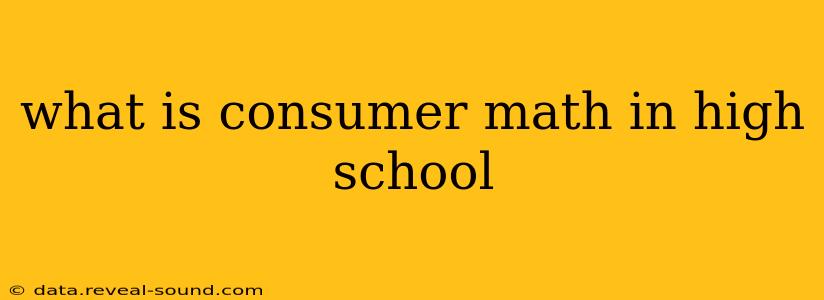Consumer math, also sometimes called applied mathematics, is a high school math course designed to equip students with the essential mathematical skills needed to navigate everyday financial situations. Unlike traditional algebra or geometry, consumer math focuses on practical applications, preparing students for real-world scenarios they'll encounter as adults. It's all about learning how to manage your money effectively.
This course goes beyond abstract concepts and delves into the practical application of mathematics in personal finance. Instead of solving complex equations, students learn to budget, calculate interest, compare loan options, and understand taxes—skills crucial for financial literacy.
What Topics are Covered in Consumer Math?
The curriculum typically includes a variety of topics designed to provide a comprehensive understanding of personal finance. These often include:
-
Budgeting and Financial Planning: Learning to create and stick to a budget, track expenses, and plan for long-term financial goals like saving for a down payment on a house or retirement.
-
Banking and Credit: Understanding different types of bank accounts, interest rates, credit scores, credit cards, and the impact of debt. This often includes exploring the implications of good and bad credit.
-
Loans and Mortgages: Calculating loan payments, understanding APR (Annual Percentage Rate), comparing different loan options, and exploring the process of buying a home.
-
Investing: Learning basic investment strategies, understanding different investment vehicles (stocks, bonds, mutual funds), and the importance of diversification. This section often provides a foundation for further financial learning in adulthood.
-
Taxes: Understanding basic tax principles, filling out tax forms, and planning for tax obligations.
-
Insurance: Exploring different types of insurance (health, auto, home), understanding premiums, deductibles, and the importance of insurance coverage.
-
Shopping Smart: Comparing prices, understanding discounts and sales, and making informed purchasing decisions.
What are the Benefits of Taking Consumer Math?
Taking a consumer math course offers several key advantages:
-
Improved Financial Literacy: The most significant benefit is the development of strong financial literacy skills. Students gain the knowledge and skills needed to make informed financial decisions throughout their lives.
-
Increased Confidence in Handling Finances: Understanding the underlying mathematical principles behind personal finance builds confidence in managing money effectively.
-
Preparation for Adult Life: The course provides practical skills essential for navigating the financial aspects of adulthood, including budgeting, saving, borrowing, and investing.
-
Reduced Financial Stress: By learning how to manage finances effectively, students can reduce financial stress and avoid common financial pitfalls.
-
Better Career Opportunities: While not directly job-specific, strong financial skills are beneficial in many careers and demonstrate responsibility and resourcefulness.
How Does Consumer Math Differ from Other Math Courses?
Unlike algebra or calculus, which focus on abstract mathematical concepts and problem-solving, consumer math is application-focused. It prioritizes the practical application of mathematical skills to real-world financial situations. The emphasis is less on theoretical understanding and more on practical application and decision-making.
Is Consumer Math Hard?
The difficulty of consumer math varies depending on the student's existing math skills and their comfort level with practical applications. Generally, it's considered less challenging than advanced math courses like calculus or pre-calculus, but it still requires careful attention and a willingness to engage with real-world scenarios.
What Careers Benefit from Consumer Math Skills?
While not directly leading to specific careers, strong consumer math skills are valuable across numerous professions. Individuals in finance, accounting, business management, and even entrepreneurship all benefit from a solid understanding of personal finance and budgeting.
In conclusion, consumer math is a valuable course offering practical skills that empower students to manage their finances effectively throughout their lives. Its emphasis on real-world applications makes it a relevant and essential component of a well-rounded high school education.
